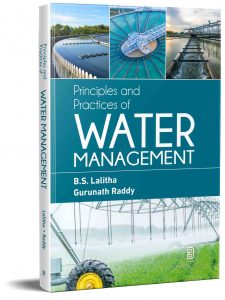The knowledge about Water Management is important since it helps to determine future Irrigation expectations of agricultural and horticultural crops. Water management that includes effective resource management includes a set of policies and regulations. Water once an abundant natural resource is threatened due to droughts and overuse. Water scarcity affects more than 40 per cent of the world population while, water related disaster accounts for 70 per cent. There is an additional pressure on food supply and natural resources, since the global population is rapidly growing. It is estimated that about nine billion people have be to feed and which demands additional 60 per cent agricultural production by 2050. There has been 15 per cent increase in water withdrawal but water resources are depleting in many parts of the world. The present book titled ‘Principles and Practices of Water Management’ has been engraved keeping in view the requirement of the Under Graduate students and teachers in the field of water management as per the 5th Dean’s Committee Recommendations.
This volume covers Water management at a glance; Water resources in the world and India; Soil-water and plant-water relations; Basic terms in water management; Water and its relationship with nutrient availability /losses and water management and its relevance in crop production; Water requirement of field and horticultural crops and
impact of water stress and critical stages in different crops; methods of irrigation, efficiency of irrigation, methods to measure soil moisture, quantitative estimation of irritation water by direct and indirect methods; Expression of flowing water; Concept of water use efficiency and methods to improves water use efficiency.
The unique features:
Effort is made to describe all the elements of water management in a systematic and comprehensive manner that covers general topics about importance of water management, water resources, soil and plant water relations, water requirement of different crops, methods of irrigation, concept of water use efficiency and methods
to improve water use efficiency
The chapters are carved targeting the students and teachers in agricultural education that would serve as a study material in the classroom and aids for examinations.
Water Management at Glance
Water Resources
Soil Water Relations
Basic Terms in Water Management
Study of Soil Moisture Constants
Measurement of Soil Moisture-Direct and Indirect Methods
Plant-Water Relationship
Impact of Water Stress and Critical Stages in different crops
Water and its Relationship with Nutrient Availability and Losses
Water Management and its Relevance in Crop Production
Concept of Evapotranspiration and its Management
Water Requirement of Field and Horticultural Crops
Methods of Irrigation
Efficiency of Irrigation and Methods to Measure
Quantitative Estimation of Irrigation Water by Direct and Indirect Methods
Expression of Flowing Water and Mutual Relations
Concept of Water Use Efficiency and Methods to Improve Water Use Efficiency
Assessment of Water Requirement of Crops and Factors Affecting Water Requirement
Scheduling of Irrigation-Approaches and Methods
Suitability of Water for Irrigation
Concept of Drainage and Methods


